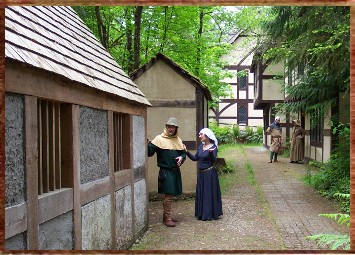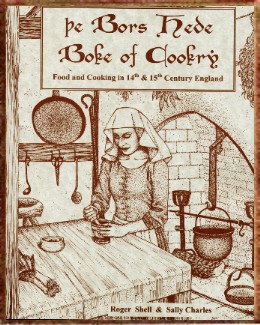 Þe Bors Hede Inne is part of the Camlann Medieval Village: a Living History Museum project. Camlann re-creates the every-day experience of a 14th century rural village typical of Somerset, England for the study, interpretation, and enjoyment of medieval arts and culture.
Þe Bors Hede Inne is part of the Camlann Medieval Village: a Living History Museum project. Camlann re-creates the every-day experience of a 14th century rural village typical of Somerset, England for the study, interpretation, and enjoyment of medieval arts and culture.  Þe Bors Hede Boke of Cookry is a unique, illustrated, 214-page work that contains 101 recipes in Middle English with modern translations and modern working recipes. Introductory chapters explain food, gardens, kitchens, cooking techniques, and meals in the Middle Ages. There's also a 85-page glossary of Middle English culinary terms. A veritable goldmine research guide for the medieval historical writer.
Þe Bors Hede Boke of Cookry is a unique, illustrated, 214-page work that contains 101 recipes in Middle English with modern translations and modern working recipes. Introductory chapters explain food, gardens, kitchens, cooking techniques, and meals in the Middle Ages. There's also a 85-page glossary of Middle English culinary terms. A veritable goldmine research guide for the medieval historical writer.FRYTOR OF ERBYS
Middle English
Take gode erbys • grynde hē and medle hē wt flo~ and wat~ & a lytel ȝest and salt • and frye hē ī oyle • and ete hē wt clere hony
—"The Forme of Cury", London BL Add. 5016, a 15th C. copy of a 1390 compilation, translated by Samuel Pegge
Modern Translation
Take good herbs, grind them, and mix them with flour and water and a little yeast and salt, and fry them in oil, and eat them with clear honey.
Working Recipe
1 package dry yeast
1/4 cup warm water
1 cup fresh herbs (mustard greens, parsley, anise, and cilantro)
2 cups flour
2 1/4 cups cool water
1/2 tsp salt
1/4 cup honey
oil for frying
Dissolve yeast in warm water; set aside. Wash and dry herbs; mince. Mix flour and cool water together; add dissolved yeast, salt, and herbs. Cover and allow to sit in a warm place for one hour. Heat oil in deep fat fryer to 375oF. Drop spoonfuls of batter into fat and fry until golden, turning once. Drain and serve drizzled with honey.
Now, that sounds really delicious and I am going to give it a try. The Camlann Medieval Village looks great. What an interesting project. Whenever I hear the word Camlann I always think of King Arthur.
ReplyDeleteNicola, thanks for stopping by. I've always been meaning to ask Robert, the owner, why he chose this particular name, especially since it has a well-known ancient pedigree. The next time we're there, I'll ask.
ReplyDeleteRobert and his wife also entertain with music during the meal: he plays the lute, she the harp, and they sing. The food's seemingly authentic as is the words he uses to chat with guests. It's a very cool setup.
Yes, it would be interesting to know why they chose to call it Camlann. I like it - very evocative. And how lovely to listen to the lute and the harp whilst you eat, rather than canned music!
ReplyDelete